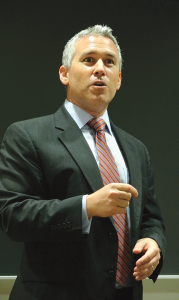
Jonathan Schanzer discusses the Palestinian political system.
Counterterrorism expert Jonathan Schanzer said Palestinian politics are overlooked in the field of Middle Eastern studies in a lecture in White-Gravenor Hall on Wednesday.
The event was co-sponsored by the Georgetown Journal of International Affairs and the Georgetown Israel Alliance.
During his talk, Schanzer emphasized the fact that many people who study the Israel-Palestine conflict do so in a one-sided manner.
“Most people study the Middle East by the Israeli perspective, or the perspective of the Israeli-Palestinian conflict. Some people might have studied the Palestinian system, but that is extremely rare,” Schanzer said.
GIA Co-President Jessica Tannenbaum (COL ’16), a staff writer for The Guide, said that she appreciated Schanzer’s perspective.
“I think it was important for him to shift the focus just from looking at the Israeli perspective, to looking at the Palestinian perspective as well, because in order to understand this conflict, we need to look at both sides,” Tannenbaum said.
Schanzer also said he believes that having an understanding of the Palestinian political system is crucial to developing an understanding of the region, emphasizing the interconnectedness of the Israel-Palestine conflict and other major issues ongoing in the Middle East.
“The term that is used right now, a derisive term, is called linkage. If you just solved the Israel-Palestinian conflict you might be able to prevent Iran from going nuclear, the civil war in Syria and the tumult from the Arab Spring,” Schanzer said. “You might be able to prevent many things by just getting down to the core of providing the Palestinians with the state that they so desire and have been agitating for since the 1940s.”
Schanzer noted the division of the Palestinian government and how the two-state solution, which proposes the creation of two separate and autonomous states of Israel and Palestine, ignores that the West Bank and the Gaza Strip are two distinct entities separated by a barrier that Palestinians are virtually unable to cross.
“You have the Gaza strip being controlled by the Hamas and the West Bank by Fatah,” Schanzer said. “These are two separate governments, two separate funding sources, two separate police and security apparatus. These two states have not been able to agree on anything, and yet, all we have been talking about in Washington is a two-state solution.”
Event attendee Sydney Jean Gottfried (COL ’17) said that she felt like this distinction cleared up a misconception that many Americans have about Palestine.
“I thought that it was really interesting to bring to light how in Palestine there are two sides, with the Hamas and the Fatah and I think that most people don’t see that,” Gottfried said. “They just see Israel and Palestine and it can be hard to understand that within Palestine there is not a united front.”
Ian Philbrick (COL ’17), GJIA’s undergraduate online executive editor, said he agrees that there is a problem with how we narratively frame the Israeli-Palestinian conflict.
“The way that it is depicted in the media and the way we understand the situation as policymakers or even students is not necessary true to the situation on the ground,” Philbrick said. “There is a very dangerous disconnect between what is actually happening and the policy that we recommend.”
Schanzer called for the opening up of the Palestinian political system in order to make room for innovative leaders.
“The bottom line is that Palestinians across the board don’t like their leadership and there does not appear to be any leaders in the making,” Schanzer said. “Even if there were elections tomorrow, it is impossible to tell who would be the next layer of leadership. We are looking for the next Martin Luther King or the next Mahatma Gandhi. We need to open up the political space, and this is something that we continue to ignore.”
During a question and answer session that followed the lecture, Schanzer addressed the issues of terrorism and the threat of the Islamic State group.
“There is a common denominator across ISIS, Hamas and al-Qaida, which is a radical brand of Islam,” Schanzer said. “This is not Islam itself, it is an interpretation of Islam, which the majority of Muslims reject. I believe that the biggest fight that we are all going to face is this ideology, the fact that ISIS is drawing numbers of people and has such an allure.”
Ari Goldstein (COL ’18), who attended the event, said he was satisfied with the objective view that Schanzer presented in his lecture.
“So much of the narrative around the Israeli-Palestinian conflict is driven by biased and emotional content in the mainstream media and so, hearing from an objective, experienced, research fellow like Dr. Schanzer gives a greater degree of legitimacy to the discussion and allows us to focus on what is really important,” Goldstein said.















Arafat • Oct 7, 2014 at 4:13 pm
“Schanzer called for the opening up of the Palestinian political system in order to make room for innovative leaders.”
Hey, it is open. They voted in Hamas. They are living with the results.
Hey, it is open. They voted in Abbas. He is now serving as a dictator serving his 9th year in a four year term.
Can’t help stupid.